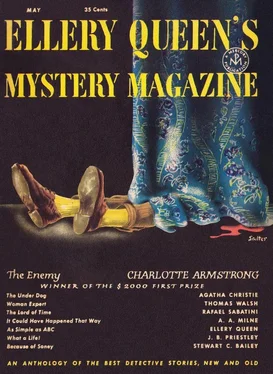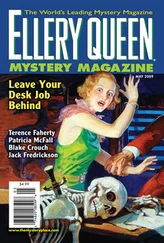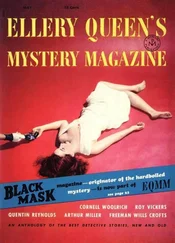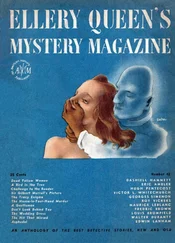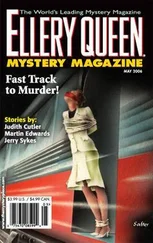Charlotte Armstrong - Ellery Queen’s Mystery Magazine. Vol. 17, No. 90, May 1951
Здесь есть возможность читать онлайн «Charlotte Armstrong - Ellery Queen’s Mystery Magazine. Vol. 17, No. 90, May 1951» весь текст электронной книги совершенно бесплатно (целиком полную версию без сокращений). В некоторых случаях можно слушать аудио, скачать через торрент в формате fb2 и присутствует краткое содержание. Город: New York, Год выпуска: 1951, Издательство: Mercury Publications, Жанр: Детектив, Классический детектив, на английском языке. Описание произведения, (предисловие) а так же отзывы посетителей доступны на портале библиотеки ЛибКат.
- Название:Ellery Queen’s Mystery Magazine. Vol. 17, No. 90, May 1951
- Автор:
- Издательство:Mercury Publications
- Жанр:
- Год:1951
- Город:New York
- ISBN:нет данных
- Рейтинг книги:5 / 5. Голосов: 1
-
Избранное:Добавить в избранное
- Отзывы:
-
Ваша оценка:
- 100
- 1
- 2
- 3
- 4
- 5
Ellery Queen’s Mystery Magazine. Vol. 17, No. 90, May 1951: краткое содержание, описание и аннотация
Предлагаем к чтению аннотацию, описание, краткое содержание или предисловие (зависит от того, что написал сам автор книги «Ellery Queen’s Mystery Magazine. Vol. 17, No. 90, May 1951»). Если вы не нашли необходимую информацию о книге — напишите в комментариях, мы постараемся отыскать её.
Ellery Queen’s Mystery Magazine. Vol. 17, No. 90, May 1951 — читать онлайн бесплатно полную книгу (весь текст) целиком
Ниже представлен текст книги, разбитый по страницам. Система сохранения места последней прочитанной страницы, позволяет с удобством читать онлайн бесплатно книгу «Ellery Queen’s Mystery Magazine. Vol. 17, No. 90, May 1951», без необходимости каждый раз заново искать на чём Вы остановились. Поставьте закладку, и сможете в любой момент перейти на страницу, на которой закончили чтение.
Интервал:
Закладка:
There was nothing colorless about his voice now, as he answered the call. It was not the voice of a waiter at all, and there was a terrible urgency in it. As he spoke, a faint ring of moisture appeared just below the line of his graying hair.
“Hello, hello! Yes, that’s me,” he cried. “A daughter, eh? Yes, yes, that’s all right. Is she? You’re sure about that? Both of them? Did she say anything? Did she? Is that right? Oh, that’s fine. Yes, of course. How soon? All right, then, I’ll be round at ten in the morning. And thank you very much. Yes, I’m sure she is. Thank you. And tell her how glad I am, don’t forget that. Yes, at ten.”
After he had put down the receiver, he drew a long breath, waited a moment and wiped his forehead, then went back to the office. “It’s all right,” he said to the reception clerk. “I’ve finished.”
“What’s the news?” that young lady inquired.
“A daughter, and they’re both doing fine.”
“That’s good. What’s the baby like?”
“Only a little one — six pounds and a bit,” replied the waiter.
“The little ones are nearly always the best. That’s what my cousin says, and she does maternity work. Well, you’re a grandfather now.”
“So I am,” said the waiter. “I never thought of that. An hour ago I was just a father, and now I’m a grandfather. That’s queer, you know.”
“It’s a queer world, that’s what I always say. Let me see, haven’t I met your daughter? Hasn’t she been round here to see you once or twice?”
“That’s the one,” said the waiter, and there was a distinct note of pride in his voice. It suggested that the baby had been lucky to find such a mother, that he had been lucky to have such a daughter, and that even the reception clerk had been lucky in merely meeting such a girl. A proud grandfather, a partly relieved though still anxious father, the waiter now withdrew, to think things over. It had been his job to see his daughter through this queer and difficult time. It was her first baby, and her husband, a good lad but not quite as steady as he might be, was now trying his hand at being a steward on a big cargo boat, and at this moment was somewhere off Sydney. If you had seen the waiter clearing away those two glasses in the Brown Lounge, you would not have realized that his forehead was still damp with perspiration and that his head was humming with plans.
Nothing happened in the Brown Lounge until a little after nine. Then the massive sideboard, the grim armchairs, and the sad steel engravings were disturbed by the entrance of a woman in a rather dubious fur coat. She still carried with her, at once defiantly and anxiously, the red and bronze remains of somewhat hard good looks. She belonged to that mysterious class of women who are often found behaving “like perfect ladies” in places that perfect ladies usually contrive to avoid. Once inside the lounge, this woman rang the bell and then made several movements that suggested, with truth, that she was in an agitated state of mind.
The bell was answered by our friend the waiter. He came in as a waiter, but the moment he saw who it was that had rung the bell, all the waiterishness departed from him and he looked what he was — namely, a surprised, annoyed middle-aged man.
“What do you want?” he asked.
“Wanted to talk to you, Joe,” the woman replied, promptly, “and I thought the easiest way would be to come in here and not go asking for you at the back. Nobody’ll come in, will they?”
“They might.”
“Yes, and then they might not,” she retorted.
“Well?”
“Listen, Joe,” she said, in a very different tone of voice, “what about Alice? How’s she getting on?”
“Who told you about Alice?”
“What’s it matter who told me? If you want to know, I saw Mrs. Brewer, and she told me you’d told her Alice was going to have a baby. Joe, tell me — what’s happened? Is it all right?”
The waiter was silent for a moment.
The woman gave a little yelp of impatience, then seized his arm and shook it. “Come on. Don’t stand there like that. What is it? My God, if she’s—”
“She’s all right, at least so far she is,” he told her, curtly. “It happened tonight and she’s doing well.”
“What is it?”
“A girl.”
“A girl!” the woman cried, with a little emotional gulp. “A girl! Poor little devil! And they’re all right?”
“They’re both all right.”
The woman laughed, not very pleasantly. “And now I’m a grandmother. My God! — think of that. Grannie! That puts the years on you, doesn’t it? But never mind about that. Listen, Joe — and I’m serious now — I’ve got to see her. Where is she?”
“Don’t you worry. She’s all right.”
“Don’t be a fool, Joe. I’ve got to see her now. Where is she?”
“I’ve told you — she’s all right. I’m looking after her.”
“Do you mean you’re not going to let me see her now?” The woman’s voice rose almost to a scream.
“Not so much noise,” he told her.
“What do I care how much noise I make! You’ve got to tell me where Alice is and I’ve got to see her. I’m her mother, aren’t I?”
“You ought to have thought about that a long time ago, before you decided to let some of the flash fellows keep you.” The waiter was very grim now. He kept his eyes fixed on those of the woman standing in front of him. They were hard blue eyes that he saw there; and he knew them only too well, especially in this mood of rising anger, heading towards either tears or screams and curses; and as he stared at them it occurred to him that it was very odd that they should be the eyes of a woman whose name was still his, who was still his wife. They had made no attempt to live together for the last ten years, but they had not been divorced. He did not want to marry again, and she did not seem to find it difficult to call herself Mrs. This and then Mrs. That.
“You always was a mean devil, Joe,” his wife proclaimed.
“Yes,” he put in, hastily, bitterly, “I’ve no doubt you’ve found ’em not so mean where you’ve been since.”
“Well, if you want to know, I have. Now, look here, Joe. I’m the girl’s mother, and this is the time when a girl wants to see her mother, and I’m going to see her. Where is she?”
“I’m not going to tell you, and you’re not going to see her. Leave her alone. She doesn’t want you, and I don’t — I only want you to be a long way off.”
“Don’t worry, I’m not after you . You never was any catch at any time, and you’re not one now, I can tell you. But I’ve a right to see my own child. She’s my daughter.”
“Not now, she isn’t,” the waiter told her. “You’ve done. I’ll see to that.”
“You’ll see to a lot, won’t you?” she jeered. “One thing’s certain, though. She’s my daughter. She might be yours, and then she might not.”
“What!” He shot out a hand, and it fastened on her wrist. “What’re you trying to tell me now? What’s the idea?” He was really ferocious now, unlike any respectable waiter.
This sudden ferocity left the woman uneasy. She wrenched her arm away, and then said, hastily: “Oh, don’t be a fool, Joe. You know very well she was yours, all right. Where is she? I only want to see her and the baby together. What’s the harm in that?”
“That’s my business. I’ve not interfered with you, so don’t you interfere with me. You’ve gone your own way, so just keep to it. And leave Alice alone. I warn you — leave her alone.”
At this moment, while they were still glaring at one another, somebody came quietly into the room. She was a tiny old woman, all rings and brooches and lilac silk and black satin, and the waiter knew her well, for she came up from the country regularly.
Читать дальшеИнтервал:
Закладка:
Похожие книги на «Ellery Queen’s Mystery Magazine. Vol. 17, No. 90, May 1951»
Представляем Вашему вниманию похожие книги на «Ellery Queen’s Mystery Magazine. Vol. 17, No. 90, May 1951» списком для выбора. Мы отобрали схожую по названию и смыслу литературу в надежде предоставить читателям больше вариантов отыскать новые, интересные, ещё непрочитанные произведения.
Обсуждение, отзывы о книге «Ellery Queen’s Mystery Magazine. Vol. 17, No. 90, May 1951» и просто собственные мнения читателей. Оставьте ваши комментарии, напишите, что Вы думаете о произведении, его смысле или главных героях. Укажите что конкретно понравилось, а что нет, и почему Вы так считаете.
